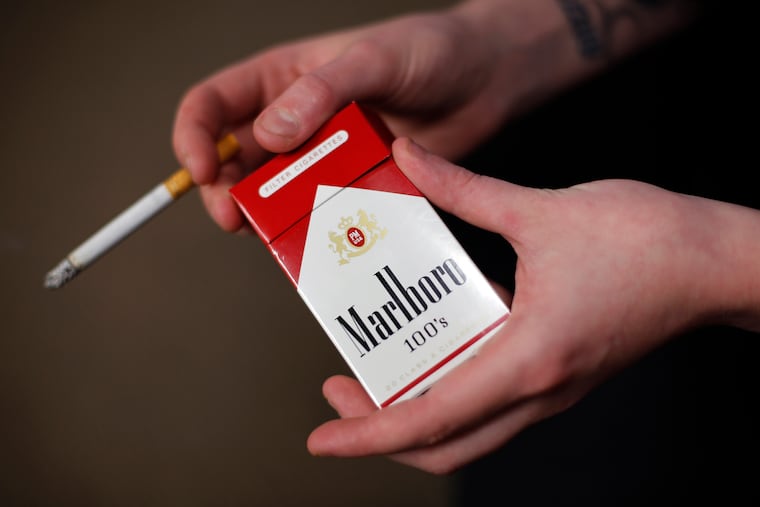Philly bans tobacco use at city-funded inpatient addiction treatment programs
City officials made the decision based on research that shows quitting smoking while undergoing addiction treatment gives patients a better chance at recovery.

Starting in the new year, the 80 inpatient drug treatment programs that receive city funds will ban smoking at their facilities — for patients and staff alike.
It’s a decision that’s been in the works since the city’s mental-health facilities barred tobacco use in 2016. City officials say the move is bolstered by growing research that shows that quitting smoking while undergoing addiction treatment gives patients a better chance at recovery.
“Addiction is a fatal disease — and that has come to the forefront because of the opioid epidemic," said Chris Tjoa, the deputy chief medical officer at Community Behavioral Health (CBH), which runs Philadelphia’s Medicaid programs. "Acute diseases draw on our attention more than chronic diseases. But at the same time, tobacco is killing more people, harming more people, and it’s projected to continue to do so. From a public health standpoint, it was imperative we do something about that.”
Tobacco use is killing far more people in Philadelphia than overdoses or gun violence, health officials said. And people with substance-use disorders are at a particularly high risk of tobacco-related diseases.
About 69 percent of Philadelphians with substance-use disorders smoke, compared with 48 percent with alcohol-use disorders and 22 percent of people who abuse neither drugs nor alcohol, said Joel Avery, a spokesperson for the Department of Behavioral Health and Intellectual disAbility Services (DBHIDS).
Starting Tuesday, inpatient treatment centers that contract with the city will be entirely smoke-free, and patients will be offered smoking cessation treatments in addition to drug treatment. That could include medications like Chantix and Wellbutrin — an antidepressant that also helps curb cravings — as well as nicotine replacements and counseling.
DBHIDS Commissioner David Jones said that when the city implemented a smoking ban in its mental health facilities, some worried it would deter people from seeking treatment. Two years into the policy, he said, the smoking ban does not appear to have factored into those patients' decision to seek treatment.
Still, some addiction treatment providers initially balked at the plan, said Carol Larach, CBH’s director of integrated care: “We had providers who really embraced it. Others felt like [patients smoking] was the least of their worries.”
Penn Presbyterian Medical Center’s 18-bed inpatient treatment program was the first city-funded site to make the switch, in April. Julie Dees, the center’s director of behavioral health, said staffers had initially expressed concerns that patients would choose other facilities, or leave against medical advice once they realized they were not allowed to smoke.
“Our census has been holding steady — we’re more consistently full this year than last,” she said. “Do patients complain? Of course.” But the city sent trainers to help staff learn how to help patients quit smoking, and hired the Pennsylvania Horticultural Society to plant a garden with seats and lawn games where patients would once take their smoke breaks — up to five a day — before the ban.
“Smoke breaks were the only time the patients were getting off the unit,” she said. “We were looking at how we could make it a positive experience.”
Dees said she’s been fielding calls from other treatment providers worried about making the switch.
“They’re concerned that people are not going to want to go to their program, or try to find a non-city-funded provider, or break the rules" by sneaking cigarettes onto the ward,” she said. “There’s also still a holdover mentality from a lot of people in the field of ‘first things first.’ That, you give up the really bad thing, and we’ll deal with smoking later.”
There was some concern, she said, that requiring people in drug addiction treatment to quit smoking at the same time would make recovery harder. But research shows that people who continue to smoke during drug addiction treatment have a higher risk of relapsing. Some research has suggested that smoking activates not only the brain’s nicotine receptors, but may act on its opioid receptors as well.
A 2013 study in the medical journal Nicotine and Tobacco Research that followed 174 people seeking treatment for opioid addiction — 81 percent of whom were smokers — found that people who kept smoking while in treatment were less likely to complete a six-day detox program tapering them off methadone. They also had more cravings for opioids.
People who weren’t allowed to smoke, or had never smoked in the first place, had fewer cravings and a better shot at completing the treatment program, the study found.
City officials also cited a 2002 study, conducted at longer-term methadone maintenance programs in Los Angeles, that found patients were more likely to have drug-free urine screenings on weeks when they didn’t smoke than during weeks they did.
Matt Tice, the director of Pathways to Housing, a Philadelphia-based housing program for people in opioid addiction that doesn’t require sobriety of its participants, said smoking can be a “major relapse trigger” for participants.
“It’s often so ritual-based that it can have a lot of muscle memory in people’s routine [for using drugs] — wake up, prepare a shot, smoke a cigarette," he said. “Take one [cigarette] out, and it’s real hard to break the pattern.”
Tjoa said that because smoking doesn’t kill as immediately as a drug overdose does, its role in addiction-related diseases is often overlooked.
“This is really the influence of industry,” he said. “We got to the opioid epidemic because people were successful in convincing doctors that certain painkillers were risk-free in terms of addiction. And Big Tobacco has influenced our society in the ways we think about nicotine.”